De Amerikaanse schrijver Louis Bromfield werd geboren op 27 december 1896 in Mansfield, Ohio. Zie ook alle tags voor Louis Bromfield op dit blog.
Uit: The Rains Came
“It was the hour of the day that Ransome loved best and he sat on the verandah now, drinking brandy and watching the golden light flood all the banyan trees and the yellow-gray house and the scarlet creeper for one brilliant moment before the sun, with a sudden plunge, dropped below the horizon and left the whole countryside in darkness. It was a magical business which for his northern blood, accustomed to long still blue twilights of Northern England, never lost its strangeness as if suddenly the whole world stood still for a second and then slipped swiftly into an abyss of darkness. For Ransome there was always a shadow of primitive terror in the Indian sunset.
And here in Ranchipur there were other things besides the beauty of the golden light. It was the hour when the air grew still and laden with a heavy scent compounded of the smoke of burning wood and cow dung and of jasmine and marigold and the yellow dust raised by the cattle being driven home from the burnt pasture of the race course on the opposite side of the road, the hour too when distantly one heard the faint thumping of the drums from the burning ghats down by the river beyond the Maharajah’s zoological gardens, when the screaming of the jackals began as they crept to the edge of the jungle waiting for the sudden darkness to bring to their cowardly yellow bodies the courage to start out and seek on the plains what had died during the day. At dawn the greedy vultures would succeed them, coming out of caverns and dung-covered thorn trees, for the beasts which had died during the night. And always at this hour too came the fine thread of sound from John the Baptist’s flute, as he squatted at the gate welcoming the cool of the evening.
John the Baptist sat there now, under the vast greedy banyan which each year sent down branches that bit into the earth, struck root and claimed another square yard or two of garden. Up north, near Peshawar, there was an enormous banyan tree which covered acres, a whole forest which was at the same time a single living tree. “If the world went on long enough,” thought Ransome, “that tree might take possession of all of it, like the evil and stupidity of man slowly, relentlessly, thrusting down branch after branch with all the greediness and tough vigor of life in India.”
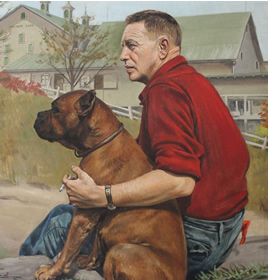
Louis Bromfield (27 december 1896 – 18 maart 1956)
De Amerikaanse schrijver en essayist Wilfrid Sheed werd geboren op 27 december 1930 in Londen. Zie ook alle tags voor Wilfrid Sheed op dit blog.
Uit: The House That George Built
“After all, not too many kids have hips like Elvis’s, but anyone who could play “Chopsticks” or whistle “The Star-Spangled Banner” could syncopate, and in no time, as Irving Berlin bragged in two of his hits, “Everybody’s doing it” in one form or another, from “Italian opera singers” learning to snap their fingers, to “dukes and lords and Russian czars,” who settled for throwing their shoulders in the air and no doubt rolling their eyes. And there was no place to hide from it, even in an ivory tower. In fact, it would become a staple of B-movie musicals to show a professor at first frowning mightily as he hears the kids jazzing up a well-known classic, only to furtively wind up, beneath the gown or the desk, tapping his own foot too, as if the body snatchers had seized that much of him. And if the “professoriate” and the “long hairiate” couldn’t stand up to it, the kid at the keyboard wasn’t even going to try. Because this is where ragtime belonged, its birthplace, its office and its home, and the great Scott Joplin was still making tunes out of it, which maybe they could use in place of Czerny’s finger exercises while no one was listening.
“What’s that you’re playing? That’s not what you’re supposed to be playing.” Someone was always listening, and one imagines a thousand fights a day over this as George or Harold or Fats would stray once more from his scales and his Bach-made-easy and start to vamp the music of his pulse, the music of the streets.”
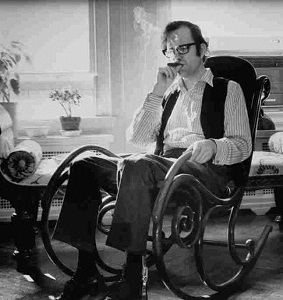
Wilfrid Sheed (27 december 1930 – 19 januari 2011)
De Amerikaanse dichter Charles Olson werd geboren op 27 december 1910 in Worcester, Massachusetts. Zie ook alle tags voor Charles Olson op dit blog.
The Kingfishers
1
What does not change / is the will to change
He woke, fully clothed, in his bed. He
remembered only one thing, the birds, how
when he came in, he had gone around the rooms
and got them back in their cage, the green one first,
she with the bad leg, and then the blue,
the one they had hoped was a male
Otherwise? Yes, Fernand, who had talked lispingly of Albers & Angkor Vat.
He had left the party without a word. How he got up, got into his coat,
I do not know. When I saw him, he was at the door, but it did not matter,
he was already sliding along the wall of the night, losing himself
in some crack of the ruins. That it should have been he who said, “The kingfishers!
who cares
for their feathers
now?”
His last words had been, “The pool is slime.” Suddenly everyone,
ceasing their talk, sat in a row around him, watched
they did not so much hear, or pay attention, they
wondered, looked at each other, smirked, but listened,
he repeated and repeated, could not go beyond his thought
“The pool the kingfishers’ feathers were wealth why
did the export stop?”
It was then he left
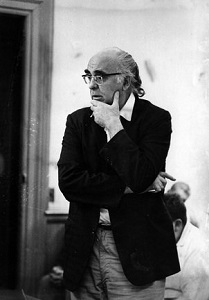
Charles Olson (27 december 1910 – 10 januari 1970)
De Spaanse schrijver Serafín Estébanez Calderón werd geboren op 27 december 1799 in Málaga. Zie ook alle tags voor Serafín Estébanez Calderón op dit blog.
Uit: An Andalusian Duel (Vertaald door Emilia Pardo-Bazan)
“I entered and sat down at once, and in such a manner as not to interrupt Oliver and Roland, and that they might not notice me, when I saw that, as if believing themselves alone, they threw their arms with an amicable gesture round each others’ neck, and thus began their discourse:
“Pulpete,” said the taller, “now that we are going to meet each other, knife in hand—you here, I there,—one, two,—on your guard,—triz, traz,—have that,—take this and call it what you like—let us first drain a tankard to the music and measure of some songs.”
“Señor Balbeja,” replied Pulpete, drawing his face aside and spitting with the greatest neatness and pulchritude towards his shoe, “I am not the kind of man either for La Gorja or other similar earthly matters, or because a steel tongue is sheathed in my body, or my weasand slit, or for any other such trifle, to be provoked or vexed with such a friend as Balbeja. Let the wine be brought, and then, we will sing; and afterwards blood—blood to the hilt.”
The order was given, they clinked glasses, and, looking one at the other, sang a Sevillian song.
This done, they threw off their cloaks with an easy grace, and unsheathed their knives with which to prick one another, the one Flemish with a white haft, the other from Guadix, with a guard to the hilt, both blades dazzling in their brightness, and sharpened and ground enough for operating upon cataracts, much less ripping up bellies and bowels. The two had already cleft the air several times with the said lancets, their cloak wound round their left arm—first drawing closer, then back, now more boldly and in bounds—when Pulpete hoisted the flag for parley, and said:
“Balbeja, my friend, I only beg you to do me the favor not to fan my face with Juilon your knife, since a slash might use it so ill that my mother who bore me would not know me, and I should not like to be considered ugly; neither is it right to mar and destroy what God made in His likeness.”
“Agreed,” replied Balbeja; “I will aim lower.”
“Except—except my stomach also, for I was ever a friend to cleanliness, and I should not like to see myself fouled in a bad way, if your knife and arm played havoc with my liver and intestines.”
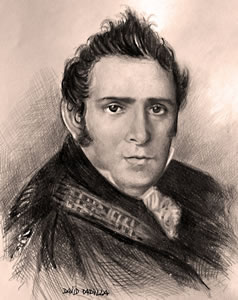
Serafín Estébanez Calderón (27 december 1799 – 5 februari 1867)
De Oostenrijkse schrijver en essayist Klaus Hoffer werd geboren op 27 december 1942 in Graz. Zie ook alle tags voor Klaus Hoffer op dit blog.
Uit: Bei den Bieresch
“Ich sah auf meine Uhr. Es war Punkt acht. Ein neuer Tag hatte angefangen. Leichter Nieselregen fiel vom Himmel. Und Umgekehrt zog einen großen Schlüsselbund aus seiner Rocktasche und sperrte die Geschäftstüre auf. Ich wartete mit meiner Scheibtruhe draußen, während er mit ein paar geübten Handgriffen Kisten mit Gemüse und Salat, der schon etwas verwelkt war, vor dem Geschäft aufbaute. “Schau dir das an!” rief er und zeigte zum Himmel. “Ein Prachtregen! Das gibt frisches Gemüse. Inga, der Regenmacher!” – Über seinen Anzug zog er einen grünen Arbeitsmantel mit dem Abzeichen einer Einkaufskette. Auf den Kopf setzte er sich eine tellergroße, verstaubte Baskenmütze. “Da, fang!” sagte er zu mir und warf mir eine blaue Kappe, die Dienstkappe der Postbeamten, zu. Es war die Kappe meines Onkels. Das Schweißband war speckig, das Posthorn vorne zerbrochen. Ein Toter hatte darin gewohnt. Ich roch daran und entfernte ein langes, schwarzes Haar. Rochen so die Toten? – Als ich fünfzehn war, war meine Großmutter gestorben, und unter der Aufsicht eines Familienmitgliedes hatte ich ihre Lippen küssen müssen. Wie hatte das geschmeckt? Ich hatte immer geglaubt, dass die Hinterbliebenen von ihren Toten essen müssten. Das Fleisch der Toten: Es roch und schmeckte wie rohes Hühnerfleisch. Einmal hatte ich meinen Urin gekostet. “Das Gehirn rülpst”, sagen die Bieresch. Sie haben für alles eine Erklärung.”
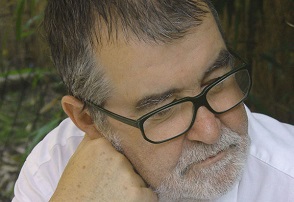
Klaus Hoffer (Graz, 27 december 1942)
